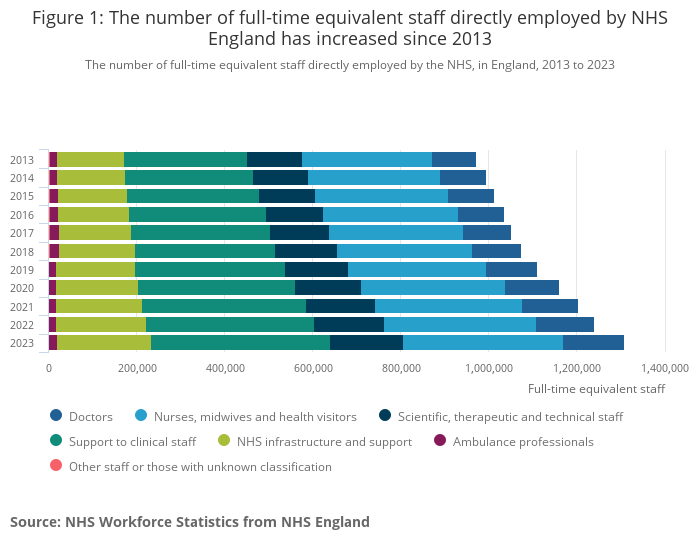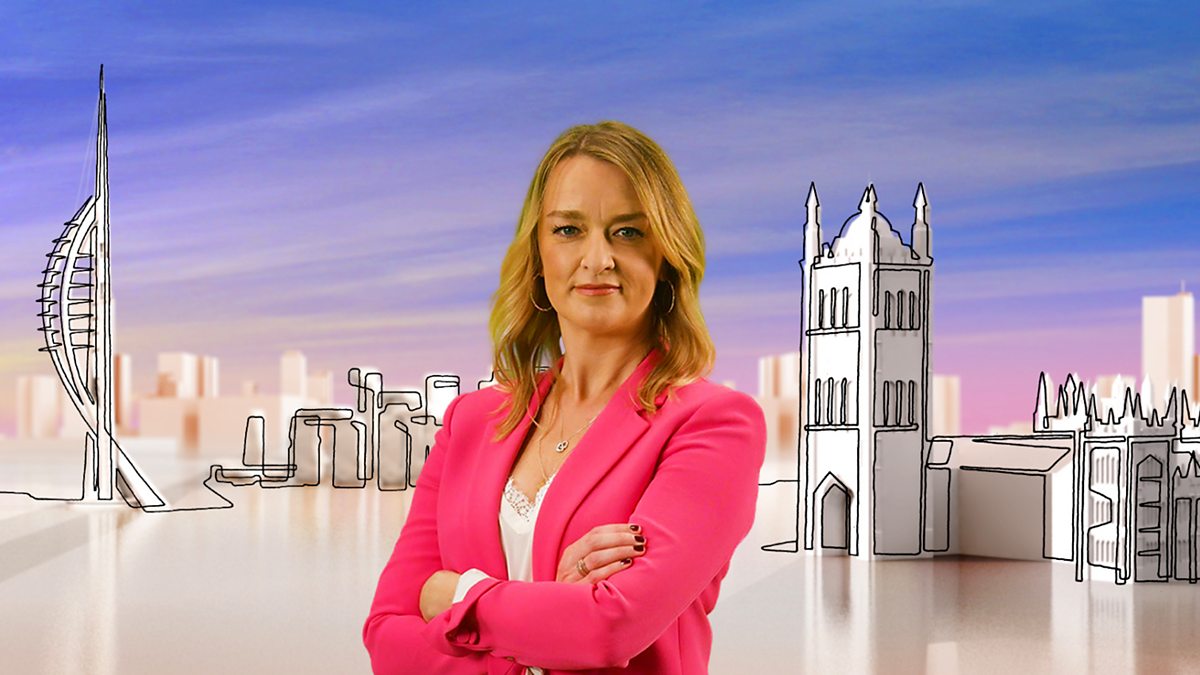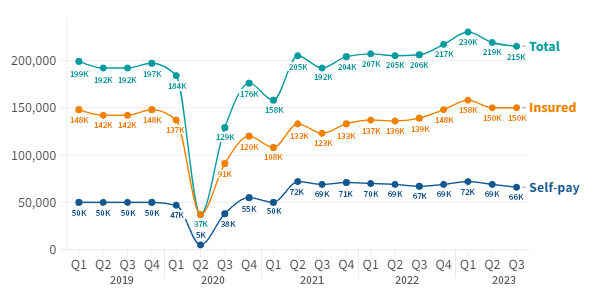Cowper’s Cut 313: Fitter, happier, more productive


(Chart taken from ONS ‘The healthcare workforce across the UK: 2024’.)
“The Head of the NHS Amanda Pritchard today says that this investment shows the Government continues to back the NHS. She says that, as a result of it, the NHS can commit to delivering 1.9% annual labour productivity growth over the next parliament, more than double the average productivity growth in public services between 2010 and 2019”.
Chancellor Jeremy Hunt, 2024 Spring Budget speech
This week’s Budget saw the Conservative And Unionist Party Government make a spectacular political U-turn. No, it wasn‘t the stealing of Labour’s policy on ending non-domiciled tax status (which funded several of Labour’s few spending promises including on the NHS: these will now need refinancing).
No: this was on public spending. We have seen sixteen months of NHS staff in an industrial dispute with the Government over pay, during which the Government had been channeling its inner Liam Byrne by repeatedly claiming ‘I’m afraid there is no money’.
Well, what do you know? There was more money after all.

After a fashion. In The Budget, Chancellor Jeremy Hunt announced an additional £2.5 billion in revenue funding for the NHS in the coming financial year.
This was probably triggered by the Institute for Fiscal Studies analysis briefed to The Guardian on Monday, which showed that “health spending in England … (was) due to suffer a 1.2% cut – worth £2 billion – in the new financial year starting next month, despite the NHS facing extra costs from continuing pay strikes and the expansion of its workforce … the health budget, almost all of which the NHS gets, is to go from £168.2 billion in 2023-24 to £166.2 billion in 2024-25, after adjustment for inflation, in 2022-23 prices”.
The IFS had briefed that “without a government rethink the reduction in funding will force the NHS to cut staffing numbers, staff pay, the services it provides to patients or all three”. Cue the Tory rethink.
The Chancellor also announced a £3.4 billion fund to modernise NHS IT. It’ll be interesting to see whether these newly-announced billions include budgets to train the workforce, and to work with clinical staff to redesign processes to maximise improvement and system management.
Upon closer inspection, it looks as though capital funding for health is unchanged in 2024/25.
— Ben Zaranko (@BenZaranko) March 6, 2024
That implies that the entirety of the "extra" £3.4bn NHS capital is for post-election, in the next SR period, and so is "extra" relative to a baseline that doesn't actually exist... https://t.co/sR6v0BdUhd
After a fashion. The IFS’s Ben Zaranko spotted that the Budget book reveals that capital funding for health is unchanged in 2024-25. So all the promised tech-utopia money relates to the next Parliament.
And then, a productivity miracle happens!
The Chancellor promised that the new £3.4 billion tech investment will “unlock” productivity gains worth £35 billion, and that this ‘invest to save’ methodology will be a new lodestar for Treasury ‘investments’.
Well, maybe. It all feels a bit ‘and then, a productivity miracle happens!’, frankly. The NHS has traditionally struggled to deliver efficiency savings/productivity gains to the value of 1% a year. And the NHS Workforce Plan already envisages a 1.5%-2% annual labour productivity gain to make its ‘maths’ add up.
There’s no breakdown of the £35bn productivity savings but there is information on some of the big ticket items. £0.4bn of the £3.4bn total will be invested to give patients more choice and ability to manage appointments. This will save £2.5bn. pic.twitter.com/FGEAAW5pLX
— Charles Tallack (@CharlesTTHF) March 6, 2024
Charles Tallack of the Health Foundation observed in a concise thread of points on Kiss (formerly Twitter) that there is scant detail on what this productivity miracle will look like and how it is to be achieved.
The IFS’s Budget analysis suggests that the £2.5 billion revenue top-up is “just enough to get a real-terms increase …
As @beeboileau has just set out at the @TheIFS budget event, this is our view on the NHS spending announcements yesterday: pic.twitter.com/XMQprNkN0d
— Max Warner (@MaxWarnerIFS) March 7, 2024

Oh, and capital budgets such as IT have been constantly raided for revenue transfers to disguise deficits for many years - and, as HSJ showed last week, they are still being raided at present
Are you reassured yet? I know I am.

Don’t mention Jeremy Hunt’s 2013 challenge to the NHS to go paperless by 2018, by the way.
The Treasury transferred £4bn from its reserve fund to the health dept to pay for the cost of strikes and pay deals, an update to parliament shows.
— Henry Anderson (@HMAnderson39) March 5, 2024
Documents also confirm that the health capital budget has been cut in-year by more than £1bn. https://t.co/Bbq5Dybgma pic.twitter.com/qeATSJfLoC
HSJ’s Henry Anderson spotted the Department For Health But Social Care’s update to Parliament which makes explicit that the DHBSC’s capital departmental expenditure limit (C-DEL) was cut by more than £1 billion, and the Treasury Munchkins made £4 billion of reserves funding available for resource DEL.
Labouring towards office
Another aspect of the Chancellor’s (Spring) Budget was that he stole Labour’s policy on abolishing non-domiciled status for the overseas super-rich. It’s clearly a bit embarrassing to swipe a policy at which you’ve taken swipe after swipe after swipe, but Mr Hunt doesn’t embarrass easily.

So now Labour is ongoing to need to make up some new numbers, if it is not to drop its few new NHS commitments that the non-dom tax money was meant to fund.
In reality, this won’t make any difference. Nobody who is serious believes that taxes are not going to rise in the next Parliament, whoever wins the General Election which must be called by December (but may happen in January 2025).

Since it’s going to be Labour, with a massive majority, this really is not a material point.
Iron while the strike’s hot
GOVERNMENT: Ah, but do you, though? Do you <i>really</i> want some more money? Because we’ve got to be realistic and everything. Tax cuts won’t just fund themselves.
— Andy Cowper (@HPIAndyCowper) March 5, 2024
CONSULTANTS: Yep. here’s a vote. We want more money.
THERE IS A PAUSE.
GOVERNMENT: OK, here’s that more money.
Could the consultants‘ industrial dispute over pay be on its way to ending?
It certainly seems so.
After constructive negotiations, I am glad this revised offer is being recommended to NHS consultants.
— Victoria Atkins (@VictoriaAtkins) March 5, 2024
It will:
- modernise pay structures
- address gender pay issues
- enhance parental leave options. https://t.co/Nh0bynJGOH
The BMA consultants committee announced that it recommends a ‘yes’ vote for the new agreement, which won the extra money from the Government that was previously ‘unaffordable’ and ‘unrealistic’.
The revised offer includes additional pay: a 2.85% (£3,000) consolidated uplift for those who have been consultants for between four and seven years. It promises important changes to the pay review body (DDRB), and removes the previous offer’s threat of changes to Supporting Professional Activities (SPA) time.

What, then, of the Government’s ongoing pay disputes with the SAS doctors? And the juniors?
SOS Atkins was asked about the juniors’ ongoing dispute on the BBC Laura Kuenssberg Show, and said that the junior doctors need to come back with some reasonable expectations.
"I want to do a deal", Mrs Atkins claimed, asserting that it was "regrettable" that junior doctors "walked out" of negotiations last year and demanding "realism" about what the taxpayer can afford to pay in boosting doctors' salaries.
Mmmmmm. “realism” depends where you stand. Earlier in the same interview, and apparently without irony, SOS Atkins blamed the NHS’s low productivity and failure to hit the PM’s promise to cut waiting lists on the strikes.
Kuenssberg’s researchers had clearly done their jobs properly, as the NHS capital and maintenance backlog of £11.6 billion was raised.
Asked about this, Atkins attempted to misdirect Kuenssberg’s attention to the 40 New (If Fictional) Hospitals Programme, and was caught by the fact that her predecessor in the role had admitted on the same show that there will not be 40 and they won’t be new hospitals.
In an heroically lame effort not to answer the question, Atkins asserted “I think we can do both at the same time, not least because that’s exactly what we’re doing”. One must have a heart of stone not to laugh.
2023 NHS Staff Survey
One of those moments when the NHS cannot hide arrives each year with the publication of the annual Staff Survey. As health economist Professor John Appleby has observed, this has long contained the powerful question ‘would you be happy for your relatives or friends to have the standard of care provided in your organisation?’
64.95% of respondents said that if a friend or relative needed treatment by their organisation, they would be happy with the standard (2022: 62.95%, 2021: 67.78%, 2020: 74.27%, 2019: 71.46%).
Tellingly, 31.23% of respondents were satisfied with their level of pay (2022:
25.61%, 2021: 32.53%, 2020: 36.54%, 2019: 37.89%).
In terms of clinical safety, 71.28% of respondents said they would feel secure raising concerns about unsafe clinical practice (2022: 71.89%, 2021: 75.00%, 2020: 72.66%, 2019: 71.85%); but only 56.81% were confident that their organisation would address their clinical safety concern (2022: 56.73%, 2021: 59.52%, 2020:60.51%, 2019: 59.90).
There’s a long way still to go on culture, clearly.
Private payday

It’s happy days for the private provider sector: The Guardian covered Aviva’s health-related rise in profits, and the Private Health Information Network’s latest quarterly update reveals how well the sector is doing.

The PHIN’s accompanying blog has some interesting nuggets: the number of self-pay private hospital admissions was 32% above pre-pandemic levels, although they did fall 8% to 66,000 in quarter 3 2023, compared to the post-pandemic peaks of 72,000 per quarter.
Richard Wells, Director of Healthcare Informatics, who manages PHIN’s data team, noted that “the way people are paying for their treatment does seem to be changing again. After a rapid growth in self-pay following the pandemic, private medical insurance has been firmly reestablished as the primary method of payment for private healthcare and, indeed, is now more popular than before the pandemic.
“This will be down to several factors, including the increased availability of workplace-based insurance schemes and a better understanding of the costs and benefits of medical insurance”.
Nuffield Trust Summit 2024
The Nuffield Trust’s annual Summit has retained its prime place as the most interesting annual event in health policy. Very little of the content was anything less than excellent.
Chief executive Thea Stein’s session on NHS productivity, culture and the need for psychological safety (channeling Paul Krugman, she claimed that “in the long run, it’s almost everything”) was a wonderful example of someone who actually gets the importance of NHS culture issues.
The AI session given by Dr Jess Morley was a masterpiece of hype avoidance, and the panel even featured an actual anthropologist! (Did I bore you with my hypothesis that the NHS needs a chief anthropologist much more than it needs any chief inspector?)
Chief Medical Officer Professor Sir Chris Whitty’s keynote on future patterns of disease and healthcare was a tour de force of content, but also presented with a lively and engaging wit.
And the contributions from Kevin Fong and Joe Rafferty to the session on a new approach to risk were excellent.
But Victoria Atkins
There’s a but: Health But Social Care Secretary Victoria Atkins gave a keynote speech and Q&A. It was genuinely, honkingly bad.
I had thought that the worst efforts of the speeches of her predecessors Sajid ‘The Saj’ Javid and Steve ‘The Banker’ Barclay would be a long time being beaten.
I was quite wrong.
This session was the day after Mr Hunt’s Budget landed, and so inevitably she had to bang the gong for the extra money and laud the productivity initiative. Even in trying to do these uncomplex things, it was bad. There was no clarity at all about what the productivity initiative in the NHS would look like. Timescale, scope, metrics, ambitions: the basics, that you could sketch out in a couple of hours - all were notable by their absence.
HSJ’s James Illman asked Mrs Atkins for some detail on her vague mention of incentives for trusts who increase their productivity: she said some words in reply, but answer came there none.
Mrs Atkins latched on to the ‘bottomless pit/black hole’ illusion of the political right, airing without really investigating the notion of a financially unsupportable NHS. There isn’t a limitless amount of money, you know.
It was very Steve Barclay.
There was a section about how the NHS is Marks And Spencers, pre-transformation. Or something.
And in a splendid foreshadowing of the afternoon’s excellent ‘what AI is/isn’t’ session, Mrs Atkins told us that we’re on the verge of a technological revolution thanks to AI, IT and data. Or something.
It honestly made no sense at all. There was no argument.
The session was bad, at every level. Despite her team having been extensively briefed about the audience, this seemed to be a speech tailored for a Home Counties Church group. From the early 1990s.
Her tone throughout was a bizarre cocktail of hectoring and simpering. Pick one or the other, and do it with some conviction. Both would be bad choices, and make a Health Secretary look stupid, but there would at least be internal cohesiveness. The applause at the end of that session was as token and perfunctory as imaginable: it still showed twenty times the level of effort that had been put into Mrs Atkins’ presentation and preparation.
It’s coming to seem pointless writing about Mrs Atkins: a politician who can’t even make an argument. If she is (as some suggest) among the better people in the more centrist bit of the Conservative And Unionist Parliamentary Party, then they really are in the deepest trouble.
And there’s potentially another nine months of this …
MoneWatch
The business interests of Everybody’s New Favourite Noble Baroness, liar and Tory peer Michelle Mone and her husband Douglas Barrowboy, sorry, Barrowman continue to make them news.
The Financial Times picked up on Mr Barrowman’s efforts to hide the genuine tax domicile of another of his companies (not PPE Medpro, over which he and his wife are under criminal investigation), outed by the tireless Dan Neidle of Tax Policy Associates.
Recommended and required reading
Pulse reports the Royal College of GPs’ volte-face on its previous position on physicians’ associates. Going to be interesting to see where PAs’ potential regulator the Royal College of Physicians lands after its EGM.
In response to legal action from the Good Law Project, NHS England announced that it will publish a less redacted version of its Federated Data Platform contract with Palantir (COI declaration: I am on Palantir’s Health Advisory Panel).






